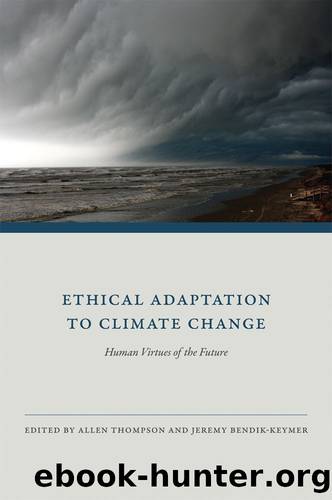Ethical Adaptation to Climate Change by Unknown

Author:Unknown
Language: eng
Format: epub
ISBN: 3339406
Publisher: MIT Press
Published: 2012-08-15T00:00:00+00:00
III
Adjusting Character to a Changing Environment
9
Ethics, Public Policy, and Global Warming
Dale Jamieson
There has been speculation about the possibility of anthropogenic global warming since at least the late nineteenth century (Arrhenius 1896, 1908). At times the prospect of such a warming has been welcomed, for it has been thought that it would increase agricultural productivity and delay the onset of the next ice age (Callendar 1938). Other times, and more recently, the prospect of global warming has been the stuff of âdoomsday narratives,â as various writers have focused on the possibility of widespread drought, flood, famine, and the economic and political dislocations that might result from a âgreenhouse warmingââinduced climate change (Flavin 1989).
Although high-level meetings have been convened to discuss the greenhouse effect since at least 1963 (see Conservation Foundation 1963), the emergence of a rough, international consensus about the likelihood and extent of anthropogenic global warming began with a National Academy Report in 1983 (National Academy of Sciences/National Research Council 1983); meetings in Villach, Austria, and Bellagio, Italy, in 1985 (World Climate Program 1985); and in Toronto, Canada, in 1988 (Conference Statement 1988). In 1988 the Intergovernmental Panel on Climate Change (IPCC) was formed to provide state-of-the-art assessments of climate science. According to the most recent IPCC report (2007), a doubling of atmospheric carbon dioxide from the preindustrial baseline is likely to lead to a 2â4.5 degree centigrade increase in the earthâs mean surface temperature. (Interestingly, this estimate is close to that predicted by Arrhenius [1896].) This increase is expected to have a profound impact on climate and therefore on plants, animals, and human activities of all kinds. Moreover, there is no reason to suppose that, without policy interventions, atmospheric carbon dioxide will stabilize at twice preindustrial levels. Moreover, as the human perturbation of natural systems becomes increasingly extreme, the probability of catastrophic climate change increases (National Academy of Sciences, 2002).
There are many uncertainties concerning anthropogenic climate change, yet we cannot wait until all the facts are in before we respond. All the facts may never be in. New knowledge may resolve old uncertainties, but it may bring with it new uncertainties. It is an important dimension of this problem that our insults to the biosphere outrun our ability to understand them. We may suffer the worst effects of the greenhouse before we can prove to everyoneâs satisfaction that they will occur (Jamieson 1991).
The most important point I wish to make, however, is that the problem we face is not a purely scientific problem that can be solved by the accumulation of scientific information. Science has alerted us to a problem, but the problem also concerns our values. It is about how we ought to live, and how humans should relate to each other and to the rest of nature.1 These are problems of ethics and politics as well as problems of science.
In the first section, I examine what I call the âmanagementâ approach to assessing the impacts of, and our responses to, climate change. I argue that this approach
Download
This site does not store any files on its server. We only index and link to content provided by other sites. Please contact the content providers to delete copyright contents if any and email us, we'll remove relevant links or contents immediately.
| Anatomy | Animals |
| Bacteriology | Biochemistry |
| Bioelectricity | Bioinformatics |
| Biology | Biophysics |
| Biotechnology | Botany |
| Ecology | Genetics |
| Paleontology | Plants |
| Taxonomic Classification | Zoology |
Sapiens: A Brief History of Humankind by Yuval Noah Harari(14371)
The Tidewater Tales by John Barth(12653)
Mastermind: How to Think Like Sherlock Holmes by Maria Konnikova(7325)
Do No Harm Stories of Life, Death and Brain Surgery by Henry Marsh(6938)
The Thirst by Nesbo Jo(6935)
Why We Sleep: Unlocking the Power of Sleep and Dreams by Matthew Walker(6707)
Life 3.0: Being Human in the Age of Artificial Intelligence by Tegmark Max(5551)
Sapiens by Yuval Noah Harari(5366)
The Body: A Guide for Occupants by Bill Bryson(5083)
The Longevity Diet by Valter Longo(5059)
The Rules Do Not Apply by Ariel Levy(4958)
The Immortal Life of Henrietta Lacks by Rebecca Skloot(4581)
Animal Frequency by Melissa Alvarez(4467)
Why We Sleep by Matthew Walker(4436)
The Hacking of the American Mind by Robert H. Lustig(4376)
Yoga Anatomy by Kaminoff Leslie(4359)
All Creatures Great and Small by James Herriot(4311)
Double Down (Diary of a Wimpy Kid Book 11) by Jeff Kinney(4261)
Embedded Programming with Modern C++ Cookbook by Igor Viarheichyk(4175)
